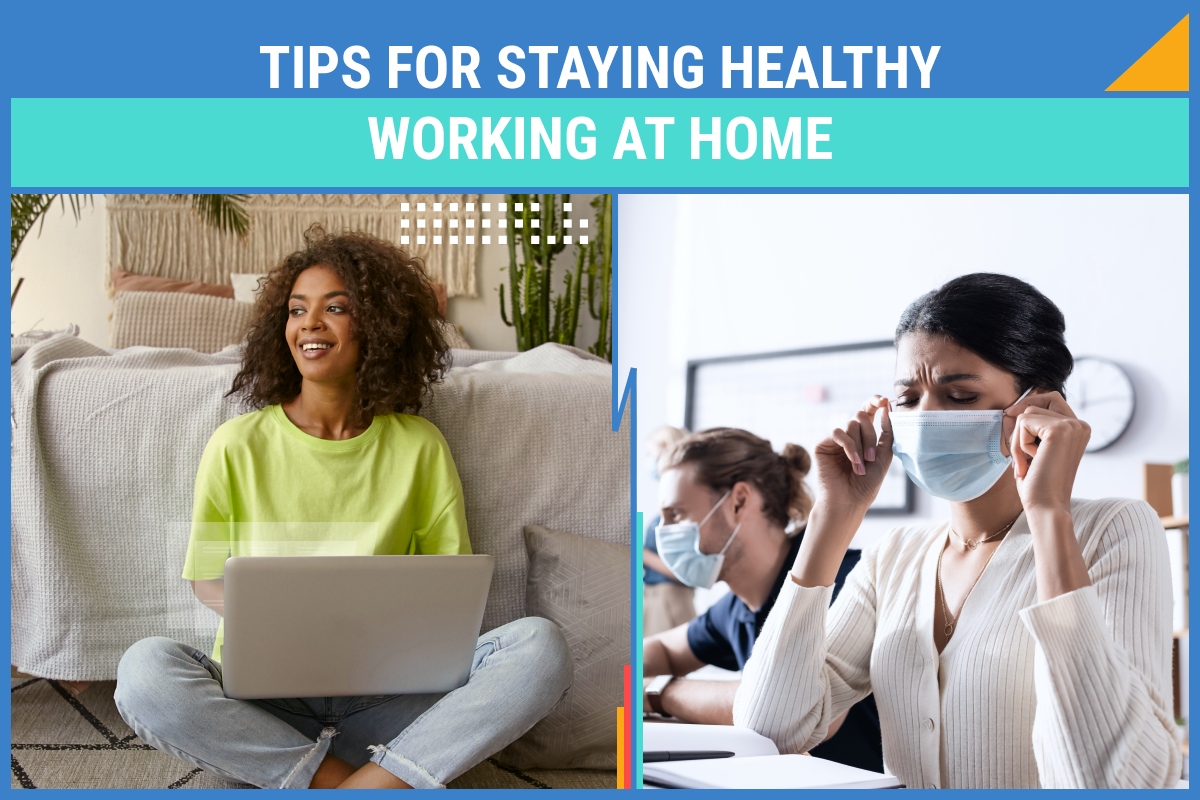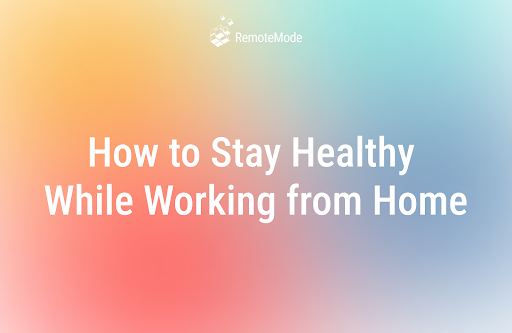5 Tips for Staying Healthy Working at Home

Remote work, especially working from home, is fast becoming a common practice for many employees. Companies learned from the pandemic’s remote work mandates that enabling their workers to perform their duties away from the office benefited both the enterprise and the employee. As the pandemic winds down, many employers are spinning up permanent remote work policies.
Don’t be surprised, then, when you see a plethora of job openings advertising remote work options. Working from home offers you a long list of advantages, including reduced commute time, improved productivity, less stress, better work/life balance, and lower costs for transportation, to name only a few. These perks, however, come at a cost to you. Working from home presents physical, mental, and social challenges that require your personal attention and mitigation. Working from home can become a curse instead of a blessing if you don’t manage your options well.
Maintaining physical health seems like a no-brainer, but if you don’t maintain a regular daily schedule, it is easy to let healthy habits slide, like a healthy diet and exercise. When you can raid the fridge and the pantry all day long, balanced meals can fall by the wayside. It’s tempting to sleep in, then jump out of bed and rush right to the laptop to start work. You may feel like you are “on” all the time, leaving no time for exercise. Difficulties can arise when the lines blur between work life and personal life.
Isolation in your little home office, assuming you have the luxury of a separate space to work, creates loneliness, which can lead to depression. If you don’t have a private work space, you may be frustrated by unrelenting disruptions. Motivation lags when you don’t feel like part of a team.
The list of downsides may seem daunting, but with a little planning and self-discipline, you can manage the challenges effectively and reap the many positive aspects of remote work from home. Below are five tips that can make your work-from-home life your best life ever.
#1 – Dedicated Work Space
When you work in an office, you depend on your employer to create a pleasant work environment. When you work from home, however, you are in complete control. Include in your workspace layout plenty of natural light. Sunlight improves your mood, your productivity, and your general health.
Create a productive space, beginning with a comfortable chair. Proper support for good posture reduces fatigue. Remove visual and auditory distractions from your workspace. A messy, cluttered, overly busy space makes concentration difficult. A room or a zone dedicated to work pays dividends in productivity, which in turn gives you more free time away from work. Train your mind to shift to work mode when you enter your work zone and leave work behind when you leave the zone.
Many home workers report that the hardest thing about their home environment are the disruptions. If your spouse or children are at home during your work period, set rules for noise and disruptions. If you have a door, close it. If you don’t have a door, put up a room divider, a screen, or a curtain to create a border around your work space. Your family or roommates wouldn’t barge in on you if you were in an office building. They should equally respect your workspace in the home.
#2 – Regular Daily Routine
Whether you work in an office or at home, your daily life consists of routines for sleeping, working, and personal activities. The flexibility of working from home may tempt you to relax the routines, but don’t do it. Go to bed and get up at regular times.
Get dressed. Experience has shown that changing into work-appropriate attire primes your brain to perform. You don’t have to wear a suit or high heels, but don’t lounge all day in your PJs.
Working from home means you have no enforced commute. Nevertheless, the transition from personal time to work time and back to personal time for most people is punctuated by commute time. Even though you don’t have to get into your car or catch a bus, create a “commute” routine—rev-up and shut-down rituals that tell your brain when to get ready for work and when to relax for home.
#3 – Communicate Regularly with Colleagues
It is easy to become isolated from coworkers when you do not share a common work environment. The interactions you have with colleagues, management, suppliers, and customers are the spice that can make a humdrum day palatable, even interesting. Exchanges and conversations happen naturally in the workplace when you can see others around you, pass them in the hall, and sit shoulder to shoulder in meetings. Physical distance becomes a barrier to the informal communications that enrich the workday.
Be more mindful and intentional about staying in contact. Instead of writing an email, make a phone call to the person you need to communicate with. Even better, make it a video call. Virtual face-to-face conversation through technology is lightyears more effective and enjoyable than a stale email.
If you are in charge of virtual meetings, leave time at the beginning and end of every meeting for the participants to visit with each other and have conversations. Staying in touch with colleagues takes more effort when you work remotely, but the effort is worth it for your mental and emotional health.
#4 – Prepare Meals and Snacks
Part of your daily work routine should include eating. Your body and brain need fuel for energy to keep you productive. Two common problems WFH workers often encounter are:
- Too much junk food.
- Wasted time making meals.
In the midst of a stressful day, the temptation is to reach for a comforting sugary snack. The fridge and pantry are handy, and you don’t have to pull out money or your credit card to activate a vending machine. Nevertheless, the physical and mental effects of high-carb, high-sugar food are the same whether you buy them from a machine or grab them from your cupboard. Chips, crackers, candy, cookies, ice cream, and other indulgences are hard to resist when they are readily available, and they will take a toll on your productivity as well as your waistline.
To avoid temptation, prepare healthy snacks ahead of time and keep them handy. A bag of nuts, a piece of fruit, celery sticks with peanut butter or cream cheese—get creative, and then put your healthy snacks in front of the junk food in your cabinet and refrigerator, or keep them in a drawer in your desk.
Lunch should be a time to relax and enjoy, not a period of stress as you cook a big meal. Plan ahead for your lunch menu. Create a healthy midday repast in the morning or even the night before. Some people create a whole week’s worth of lunches and freeze them, or they stock the freezer with quick and easy meals from the frozen food section of the supermarket. Don’t make lunchtime a chore, but keep it healthy and enjoyable.
#5 – Leave Your House
When you work from home, you may feel housebound. To avoid the negative effects of being locked in your four walls every day and night, build some outside time into your routine. Include in your personal time opportunities to engage in social interactions. Go to dinner with family or friends. Go for a walk, ride, or drive and take in new scenery. Remember to move. Follow the motto: “Motion is lotion.” Bask in natural light. Sunlight generates vitamin D, the happy vitamin. What you do when you are not working can significantly increase your productivity when you are working.
Additional Thoughts
Working remotely, especially from the comforts of your own home, is an exciting prospect with many financial and emotional benefits. The opportunities for remote work are increasing, even as the pandemic slows down. With a little effort and planning, you can make a work-from-home experience a quantum leap in your lifestyle.
RemoteMode specializes in preparing people for remote work careers. Their remote training program teaches you the skills you need to break into a number of high-demand remote jobs. Mentors and career coaches work with you along the way to set you up for success. RemoteMode’s full-service program gives you lifelike projects to build your portfolio, helps you perfect your resume, teaches you interview techniques, and assists you in building a professional social media network and searching for the ideal remote job. Contact a RemoteMode career counselor today to learn how quickly you can be ready to start your remote career.
Take the first step to your new remote career!






